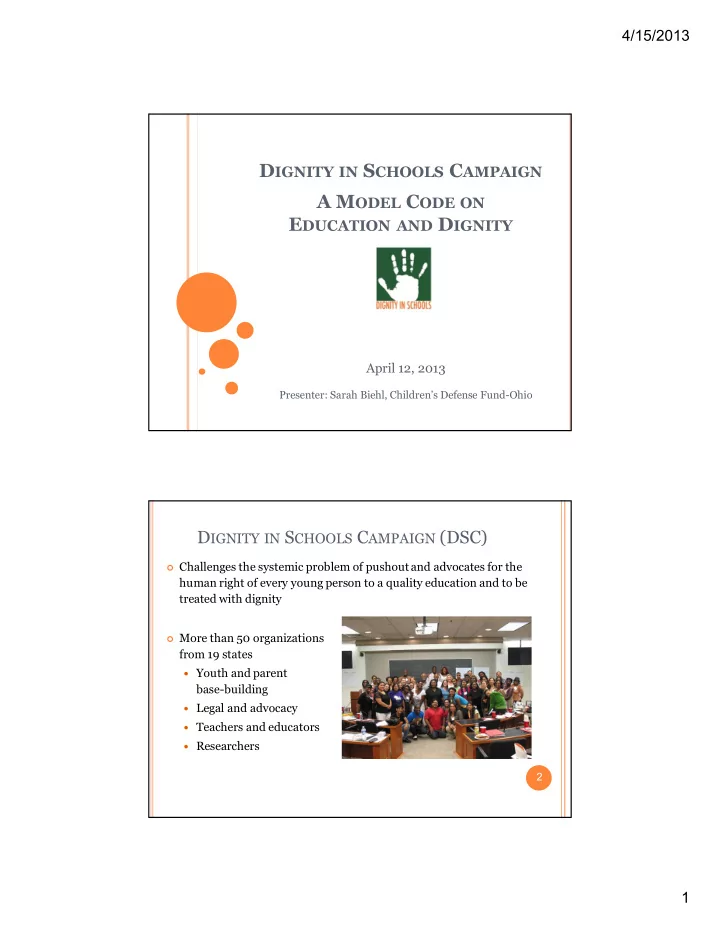

4/15/2013 D IGNITY IN S CHOOLS C AMPAIGN A M ODEL C ODE ON E DUCATION AND D IGNITY April 12, 2013 Presenter: Sarah Biehl, Children’s Defense Fund-Ohio D IGNITY IN S CHOOLS C AMPAIGN (DSC) Challenges the systemic problem of pushout and advocates for the human right of every young person to a quality education and to be treated with dignity More than 50 organizations from 19 states Youth and parent base-building Legal and advocacy Teachers and educators Researchers 2 1
4/15/2013 O UR W ORK Support members in local and state campaigns to end pushout and implement positive school discipline Advocate for federal policy change in Congress and with the Departments of Education and Justice Share information on solutions to pushout through our website, teleconferences, and 3 national meetings W HAT IS THE M ODEL C ODE ? Model policies for schools, districts and legislators to address school pushout and create safe and positive climates for learning Based on research, best practices and on the ground experiences of students, parents and educators Rooted in fundamental human rights principles that every child has a right to education and to be treated with dignity 4 2
4/15/2013 H OW WAS THE M ODEL C ODE DEVELOPED ? Drafted and reviewed by members of the Model Code Working Group Reviewed at two American Bar Association summits Reviewed and edited at community engagement sessions with students, parents and teachers in 8 different states 5 (CA, FL, GA, IL, LA, MS, NY, PA) M ODEL C ODE R ELEASE Train the trainers workshop and launch event in Los Angeles - August 2012 Trainings happening across the country through 2013 6 3
4/15/2013 5 C HAPTERS OF THE M ODEL C ODE = 5 Human Rights Principles 1. Education Support every child in reaching their full potential 2. Participation Ensure that students, parents and all stakeholders participate in decision-making Shift discipline away from punishing, to nurturing 3. Dignity academic, social and emotional development 4. Freedom from Eliminate discrimination, harassment and disparate outcomes in education Discrimination 5. Monitoring and Ensure rights to information and data, and to 7 monitor the school system Accountability S TRUCTURE OF E ACH C HAPTER Background Background Sections Human Rights Goals Recommended Language 8 4
4/15/2013 W HO C AN U SE THE M ODEL C ODE ? Students, parents and communities can compare the Model Code to current practices and use it in efforts to change policy Educators and administrators can identify best practices to implement in their schools and call for implementation system-wide District and state-level policy makers can identify language for regulations and legislation, and use guidelines to implement and monitor changes to policy 9 O VERVIEW OF THE M ODEL C ODE 4. Freedom from 5. Monitoring & 1. Education 2. Participation 3. Dignity Discrimination Accountability Full Potential of Right to Stakeholder School Climate & Eliminating Children and Information Rights Discipline Discrimination Youth Disaggregated and Steps to ensure Preventive and Practices, Core program accessible to meaningful role in positive structures and elements of the communities decision-making approaches outcomes right to education Ensuring Equity in Rights of Children Avoiding Disproportionate Education and Youth Criminalization Data Collection Discipline Rights of Parents Right to Remain in Monitoring & Students with and Guardians School Community Disabilities Analysis 10 5
4/15/2013 C HAPTER 3: D IGNITY 3.1 School Climate and Discipline 3.1.a Key Elements of School-Wide Preventive and Positive Discipline School-wide policy with student, parent & community participation School climate – physical environment, school community, SEL Positive discipline – graduated consequences, positive interventions Limiting exclusion – only the most serious offenses 3.1.b Two Models for Preventive and Positive Discipline Model 1: School-Wide Positive Behavior Interventions and Supports Model 2: Restorative Practices 3.1.c Guidelines for Exclusion 11 3.1.d Due Process C HAPTER 3: D IGNITY 3.2 Avoiding Criminalization in School Discipline 3.2.a Law Enforcement Reduce reliance on police and School Resource Officers Prohibit involvement in school discipline matters Limits on arrests and searches Complaint mechanisms Training 3.2.b Drug Policy 3.2.c Immigration Policy and Protection of Vulnerable Students 3.2.d Dismantling Status Offense Laws 12 6
4/15/2013 C HAPTER 3: D IGNITY 3.3 Right to Remain in School 3.3.a Truancy Prevention and Correction 3.3.b Alternative Schools Same requirements and standards as traditional schools Voluntary placement for students seeking alternatives No involuntary placement for academic reasons Involuntary placement for discipline requires full hearing Progress reviews and monitoring 3.3.c Right to Education for System-Involved Youth 3.3.d Right to Resume Education after Expulsion 13 Question and Answer 14 7
4/15/2013 U SING THE M ODEL C ODE Policy advocacy and local implementation Identify which sections of the Code are most relevant to your community or school Compare the Code to the existing law or policy Use “recommended language” from the Code to help shape and/or support your policy changes Share the Model Code (or sections) with decision-makers Use guidelines in the Model Code to assist with implementation 15 R ESOURCES FOR U SING THE M ODEL C ODE Executive Summary and Full Model Code Community Toolkit Tips for sharing the Code with policy-makers, students, parents, educators and communities Sample activities for holding workshops on the Code List of resources (reports, model laws and policies, etc.) to help in implementing the Code Other Community Tools Facilitator’s guide for workshops Overview and Fact Sheets on Chapters of the Code 16 8
4/15/2013 N EXT S TEPS Share the Model Code with others http://www.dignityinschools.org/our-work/model-school-code Hold a Model Code training in your community Email fernando@dignityinschools.org Contact Natalie at DSC or check out the DSC website for more information about efforts to implement the model code across the country – where it is being used, how, and by whom 17 C ONTACT I NFORMATION www.dignityinschools.org Sarah Biehl, Children’s Defense Fund-Ohio sbiehl@cdfohio.org, 614-221-2244 Liz Sullivan, National Economic and Social Rights Initiative liz@nesri.org, 646-342-0541 Natalie Chap, DSC National Coordinator natalie@dignityinschools.org, 212-253-1710 ext 312 Fernando Martinez, DSC National Field Organizer fernando@dignityinschools.org, 205-960-3498 18 9
Recommend
More recommend